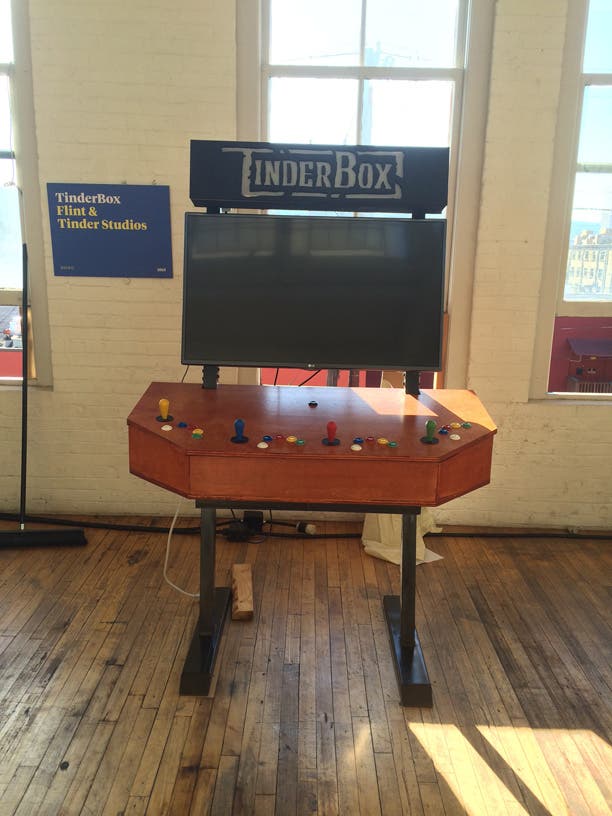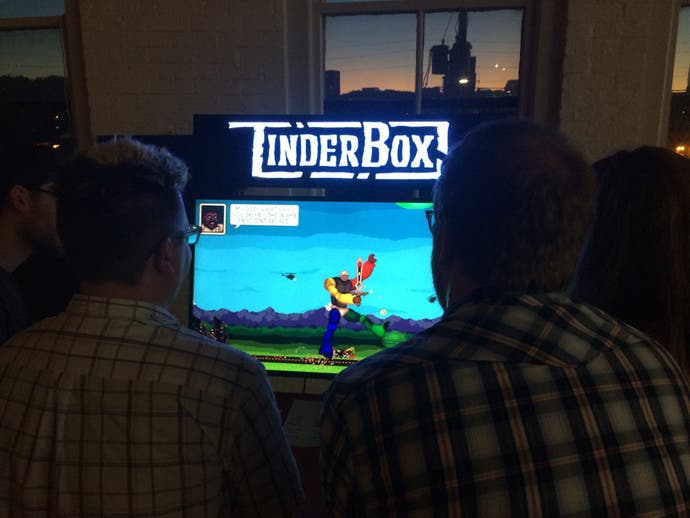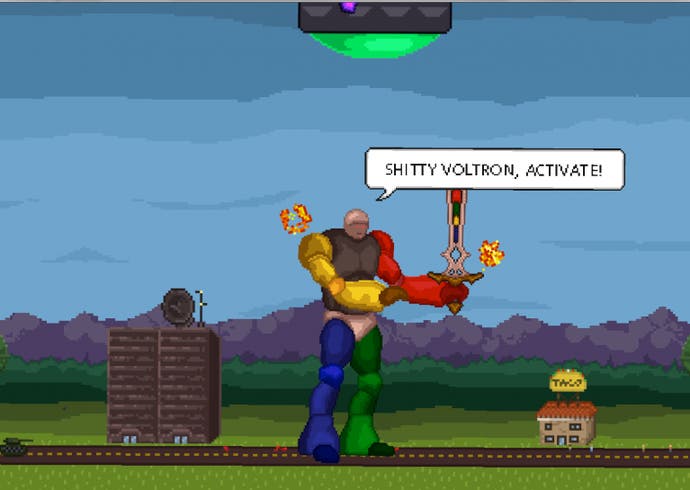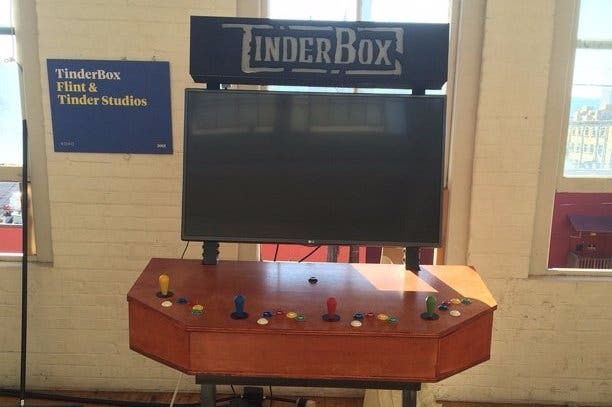Introducing TinderBox: The arcade cabinet for indie games
Featuring four-player QWOP-like Sh**ty Voltron.
These days it's not hard to find free indie games to play. With sites like Newgrounds, Kongregate and Itch.io providing a platform for up-and-coming developers, it's never been easier for aspiring game creators to bring their experimental prototypes to the masses. This will attract an audience in the relatively isolated comfort of their own home, but if someone wants to bring their passion project to the streets, there really isn't a precedent for that outside of a festival or conference - and even these are a limited to a certain demographic of industry folks. What the Portland, Oregon-based Flint and Tinder Studios aims to do is bring the immediacy and fun of experimental indie games to lively booze-swilling mingling grounds of bars and arcades. Hence: The TinderBox.
The TinderBox is an in-development arcade unit designed specifically to hold a roster of free indie games. The idea is that Tinderbox will have a back-end hub that hosts a catalogue of registered titles and bar or arcade owners can buy or rent a cabinet then decide which handful of games they want to feature at their establishment on any given day.
Speaking to the TinderBox creator and co-founder Jack Meade at a Portland coffee shop, he explains that it would provide an opportunity for developers to get their games tested in a public space by a local audience.

"The whole point of this thing is to get locally made games into local establishments," Meade says. "So you can get the people who are making games in Portland [for example] to get their games on display in an arcade cabinet at some nearby bar that they can then go to and watch people play. And they didn't have to convince Steam to put it on there. They didn't have to convince people to buy it."
Instead, developers would upload their titles to the TinderBox hub, then head to the nearest cabinet and politely ask the owner to feature their game, just as you might request a bartender turn on a football game. And due to its inviting arcade cabinet aesthetic, people will be far more likely to check it out than they would a stranger approaching them with a laptop and saying "hey, play my game."
Importantly, the Tinderbox would be free to play for patrons. Since the games would generally be small and prototype-like in nature, it's predicted that few folks would be willing to part with coins for dinky little indie titles when they have known quantities like a pinball table or Big Buck Hunter within arm's reach.
So how would it make money for the developers who put their games on there? Meade is honest about this: It won't. At least not directly. But it can be used as a networking tool to gain clout, exposure and feedback. "Maybe if they're on the TinderBox it would be easier to be on Steam, because they'd have all the feedback from people playing the game," Meade says. "So hopefully that would be a good place for people who are looking to get on a distribution platform."
Based on the conversations Meade has had with other game developers - like Samurai Gunn creator Beau Blyth and Nidhogg developer Mark Essen - many have been supportive of the project and are willing to either toss up a product prototype or allow people to play their commercial games for free like a public demo.
"They were totally down for putting their games on the TinderBox for no other reason than they've already made like 99 per cent of the money that they're going to make on their games," Meade tells me. "So why not put it out there and have people play it at an arcade? Because they don't have an arcade version of their game out anywhere."

In this way, it could work as a promotional tool for game that you could then purchase at home via other platforms. "The notion is more to get your game out there and played in arcade form," Meade says. "People are playing Duck Game on the internet against other people, which isn't nearly as fun as playing Duck Game on an arcade and bumping into each other. That's what's different about it."
Meanwhile, the business hosting the cabinet would make money from keeping patrons in tow. The more they play TinderBox, the more they stick around ordering refreshments.
Meade further explained that many arcade owners he spoke to at PAX seemed interested as they run their arcades by charging hourly rather than featuring coin-op plays. "A lot of people were really excited about it and wondering about how to get one of these," he said of the feedback from the TinderBox's first tradeshow appearance. The answer to their query: It's not ready yet, though Meade is in the process of creating a more polished, glossy prototype.
So what kind of games would be hosted on TinderBox? The cabinet's debut title - which was actually the game that inspired TinderBox in the first place - is Flint and Tinder's Global Game Jam 2015 entry: Sh**ty Vultron (censoring ours). Similar to a four-player version of QWOP, the dangerously named title tasks four players with each controlling one limb of a giant mech that can boost through the jet-propulsion of thrusters embedded in its hands and feet. The idea is for everyone to work together to pick up a sword and fly to the top of a pyramid-shaped UFO to hit its weak point before the alien menace destroys the city.
I've played a fair bit of Sh**ty Voltron, and you can too by downloading it from the Global Game Jam website. It's still in its prototype phase, but it clearly has potential. Meade tells me he and his colleagues are planning to flesh it out later this year for a commercial release featuring new game modes like races, interstitial levels offering B-Boy pose challenges, and maybe even a four vs four mode with two battling mechs. Meade says he'd love to see two TinderBoxes back-to-back, ala Killer Queen, as teams square off against one another in goofy Godzilla-like brawls.

Of course, Sh**ty Voltron's title is problematic on many levels. The profanity is an obvious sticking point while "Voltron" is copyrighted by Dreamworks. Weirdly, the two wrongs arguably make a right as the "sh**ty" could be argued as a part of parody law to allow for "Voltron" (see Nathan For You's infamous Dumb Starbucks prank as an example), but Meade has been advised by loose attorney connections to not fight this battle. So alas, Sh**ty Voltron will likely need a name change prior to release. Meade suggested SV Electromech Supersquad as a possible working title.
Sh**ty Voltron is a quietly important game, though, as it was the original basis for the TinderBox. Like Gang Beasts, its comical controls make for a fun spectator sport, though you never really get a sense of how much people enjoy it until you see it played publicly.
And that's the point. Local multiplayer games - particularly minimalist independent ones - are best played in such a setting. They're fun in a living room, but take on a life of their own in the company of curious spectators and adult beverages. That's what TinderBox hopes to facilitate.
If Meade's business plan sounds unfocused and hazy, that's because TinderBox isn't being developed as a capitalist venture for the endeavoring game developer. Financially, his goal with TinderBox isn't to make money; it's simply to not lose money (though extra scratch would be nice, he reckons). Meade's real objective is more personal: he wants to recreate the bohemian lifestyle he so enjoyed in college as an art student. And if he can hobnob with his heroes and collaborate on projects with them, that would be a dream come true for the fledgling developer.
"The whole indie game scene right now feels like what the punk scene must have felt like. People just wanting to collaborate on things," he says with a nostalgic yearning for a party that ended a few years before he was born. "I went to art school and this is the closest thing I've felt to that camaraderie where you just show up at gallery things and you drink cheap wine and talk about stupid artsy s*** and smoke weed and go to bed. [I want] to be able to carry that on as an adult."
"I don't want to run an arcade game company," he says of his long-term vision. "I just want to make games. And then have somewhere to put them."

